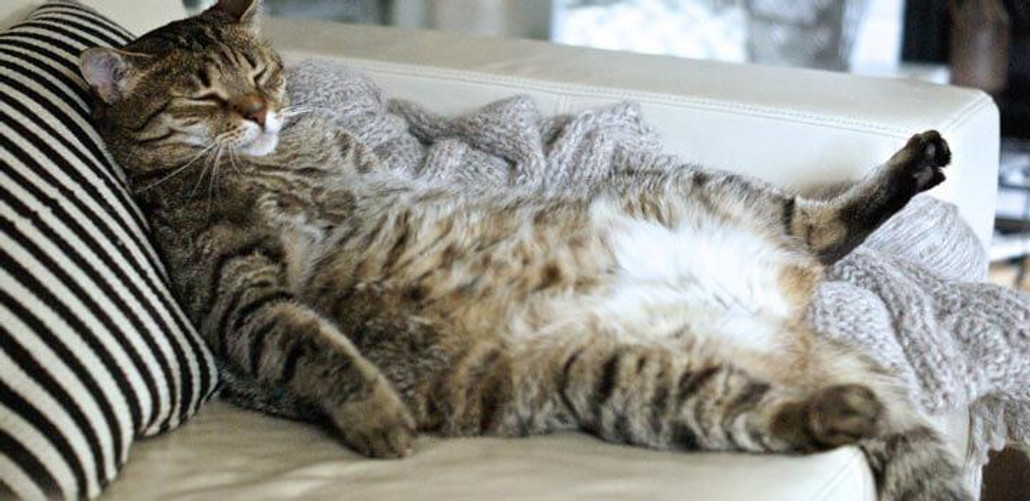
Tips for Overweight Pets
Posted by Grange Co-op on 1st Sep 2015
 We all love to treat our pets, but sometimes we can literally be killing them with kindness. Table scraps and inactivity are the two major contributors to obesity. Many of the long-bodied, low-slung dogs such as dachshunds, bassets and others can become painfully crippled when added weight practically breaks their backs by degree.
We all love to treat our pets, but sometimes we can literally be killing them with kindness. Table scraps and inactivity are the two major contributors to obesity. Many of the long-bodied, low-slung dogs such as dachshunds, bassets and others can become painfully crippled when added weight practically breaks their backs by degree.
Heavy dogs of large breeds and especially those prone to hip dysphasia will endure considerable pain and discomfort. Puppies and kittens do need a lot of nutrition to grow up, but they shouldn't be overfed. Many pet food manufacturers offer Large breed puppy foods (Nutro, Iams, Science Diet), especially designed to regulate the growth of your puppy with his bone development. Many people "push" puppies to grow fast, thinking that bigger is healthier. Unfortunately, accelerated growth can cause the painful condition of epiphisitis, an inflammation of the bone growth plates. Later in life this condition can manifest itself as arthritis or hip dysphasia. In the last month of your puppy's or kitten's first year, begin mixing adult formula kibble into their food.
If you feed a good quality fixed formula food like Rogue Premium Dog Food, Iams, Science Diet, Innova, California Natural, or Diamond you can be sure that your pet is getting a well balanced, consistent source of nutrition. Avoid feeding moist or canned foods, as these tend to be very high in fat and also pack in the gums - requiring expensive dental care. Instead of offering high calorie treats, try giving baby carrots - you'll be surprised! Try cow ears instead of pig ears (which are greasy), hoof chews, and compressed rawhide. Chew Toys keep dogs busy, clean their teeth, and make them feel like they are getting a treat without adding calories. Dogs that have been fed "free-Choice" usually self regulate, and only visit the Kibble bowl when they are hungry. Dogs fed only at specific mealtimes will sometimes scarf all their food down whether they are hungry or not because they don't know when it will be available again. Be careful with a dog that is used to a once or twice - a - day feeding, they may eat everything put in front of them if you try to switch to a free choice feeding arrangement. If you decide to switch make his breakfast bigger and dinner smaller for several days, gradually increasing breakfast until he starts to leave kibble. Eventually you can just add kibble when the bowl gets low.
 As dogs and cats mature, their caloric needs decrease even more. By five to seven years of age most dogs and cats are ready to go onto a senior formula food. Pets that are already very heavy may need to go on to a Light or weight management formula. These still offer a balance of vitamins, minerals, and nutrients but usually have lower fat and protein levels. Pouring carrots, celery, spinach, cauliflower, and broccoli blanched in chicken broth over light kibble can help the dog feel fuller with out adding many calories. Keep pets active by making them work for their treats or by substituting toys for edible treats. There are toys designed to help people who don't throw well called Chuckit! - you don't even have to bend over (much), or even touch the ball! Try visiting a dog park, even if you don't walk well, your dog will get lots of exercise playing with other dogs, and you might make some new friends, too!
As dogs and cats mature, their caloric needs decrease even more. By five to seven years of age most dogs and cats are ready to go onto a senior formula food. Pets that are already very heavy may need to go on to a Light or weight management formula. These still offer a balance of vitamins, minerals, and nutrients but usually have lower fat and protein levels. Pouring carrots, celery, spinach, cauliflower, and broccoli blanched in chicken broth over light kibble can help the dog feel fuller with out adding many calories. Keep pets active by making them work for their treats or by substituting toys for edible treats. There are toys designed to help people who don't throw well called Chuckit! - you don't even have to bend over (much), or even touch the ball! Try visiting a dog park, even if you don't walk well, your dog will get lots of exercise playing with other dogs, and you might make some new friends, too!
